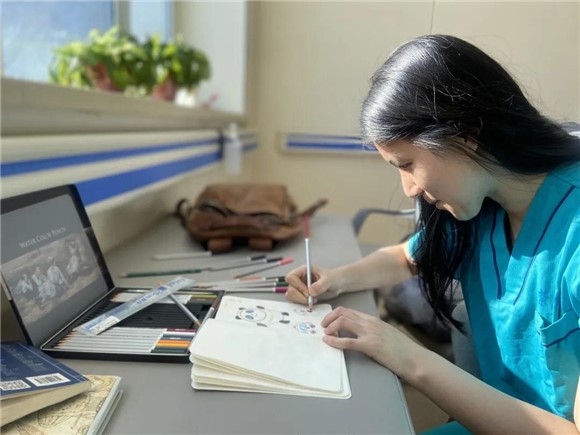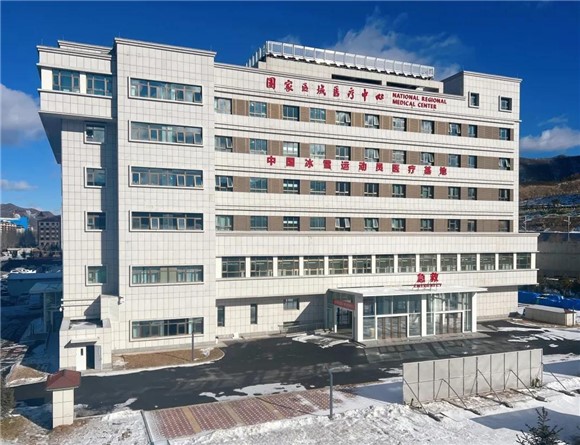[Beijing 2022 Olympics] PKUTH doctor diary: hidden heroes ensure safe Olympics
Feb 21, 2022
Peking University, February 21, 2022: Outside of the limelight, medical teams are fighting for every minute and second to keep all participants safe at the Beijing 2022 Winter Olympics. Peking University Third Hospital (PKUTH) is one of them, and has provided all-around medical care for the three competition zones. Yang Zhongwei, the leader of the PKUTH Chongli branch, has felt and grown the most during this period of near-total social isolation. Below are the warm moments he recorded in a place where the spotlight does not shine.
Cao Yuan: Responding to the Call
On the first day of the Chinese New Year, Cao Yuan, a dermatologist at PKUTH, was informed to work in the closed loop at the Chongli branch.
Olympic-related staff at the Chongli branch lived in an arid climate at a height of nearly 1,500 metres. As most of them came from different places of China, they began to develop symptoms such as rashes. This was not, however, what we had anticipated. We contacted PKUTH at once to arrange for dermatologist professors to provide remote consultation for them, but the population of skin patients continued to rise as the opening ceremony approached. The medical team in Chongli branch later sought further assistance from PKUTH on the eve of the Chinese New Year.
Cao Yuan informed me on the first morning of the Chinese New Year that she had been deployed to the Chongli branch and that she might be leaving that day alone, given the urgency.
“Since it is the first day of the Chinese New Year, may you have some time to arrange your family affairs?” I gasped over the phone, “If you leave now, you will only be able to return home in early April.”
Cao Yuan replied without hesitation, “My family is supportive of my decision to leave for work now. And my husband will send me to the train station as soon as the ticket is booked.”
I had not expected such a response from her, as I had assumed that arriving at Chongli on the third day of the Chinese New Year would suffice. Yet, Cao Yuan and her family chose to prioritize her responsibilities over their own interests.
Upon her arrival at Chongli, Cao Yuan got protective clothing put-on & take-off training, and then went straight to work. She was so busy that I could not even send her off over a working meal.
 Cao Yuan drawing comics to record her work in the closed loop
Cao Yuan drawing comics to record her work in the closed loop
In comparison to helicopter transfers and emergency operations, the public may be not familiar with the role of a dermatologist. Despite this, Cao Yuan responded to the summons without hesitation.
“Red Blood Cells” in the Main Region
The Winter Olympics medical teams in PKUTH Chongli Branch comprised of experts from various hospitals in cities including Beijing, Shijiazhuang, Zhangjiakou, Langfang, Baoding and Tangshan. The transport team is the most diverse one, with 18 members, split into six groups, from three different cities: Langfang, Baoding and Tangshan. The transport team was in charge of driving the recovered to their respective locations, taking the injured to hospitals for further treatment and even to the Beijing Capital International Airport. With their red and white ambulance making an average of 20 trips per day, they looked just like red blood cells in the human body.
Initially, I assumed that it would be hard for this team to coordinate their work because many of them came from different hospitals and hence were unfamiliar with one another. To my surprise, groups of “red blood cells” managed to “naturally” collaborate and displayed great camaraderie. However, the team faced a problem before the start of the Games – there were insufficient ambulances to transport patients.
The problem was quickly resolved with the night shift group coming earlier to work, while the other groups worked overtime in the hospital. In fact, this was done without any discussion at all, demonstrating their excellent coordination once again. When I expressed my concerns about the team skipping meals on occasion, they shrugged it off and said that “we will eat after we transfer the patient, and we can quickly microwave the dishes.”
 Emergency medical transport team
Emergency medical transport team
On February 9, emergency transport team 1 was dispatched to the Beijing Capital International Airport to transfer an international patient home. As this was the first cross-border land and air transportation, they were carefully prepared one day ahead of time, checking for details such as fuel, gas and charging of rescue equipment. In order to prevent staff in the closed loop from interacting physically with those outside the loop, the transport team pre-empted safety checks, epidemic prevention checks, as well as airport border and customs inspections. They even used large printed papers to communicate with staff outside the vehicle, in an effort to maintain the closed loop system.
Members of Winter Olympic Medical Team
The Winter Olympic medical team was made up of professionals from various hospitals. The team has been working in the closed loop since 9 January.
Outside of the closed loop, they play the roles of children, husbands and wives, fathers and mothers in their own families. During the Winter Olympics, one of the team member’s grandmother was critically ill. Although her grandmother was treated in a building only 100 meters away from the closed loop, she was unable to attend her in person.
 Trauma Center, PKUTH Chongli Branch
Trauma Center, PKUTH Chongli Branch
One team member’s child suffered serious fractures from a fall. Though I urgently prepared isolation measures for the team member to return home, he refused and stated that he had asked his family to take care of the child. “If I leave right now, my group’s other two members will be unable to cope.” He said.
Another team member even kept the fact that his wife had just given birth from us. When I arranged for him to return home, he refused, saying, “Everyone is so busy and I should not leave them. I have advised my wife to get help from the elderly at home, and they are supportive of my decision.” After speaking with this team member on the phone, I could not help but let my tears flow.
Moments like these reminded me that there are innumerable ordinary people whose small stories have contributed to the success of the Olympic Games.
I remembered being excited to share with team members about the live broadcast of the opening ceremony on the night of February 4. However, seeing how busy they were, I simply uttered “You have worked hard”. Before I realize it, I started to choke on my tears again.
After 1000 days of preparing for the “exam”, it is finally the day to enter the “examination hall”. Thank you to everyone who has warmed my heart and allowed me to strive and grow with you.
Written by: Lee Xin Ying Rachel
Edited by: Ye Yimeng
Source: PKU News (Chinese)


